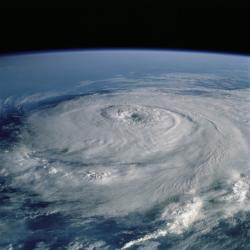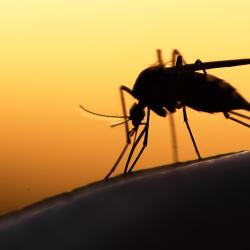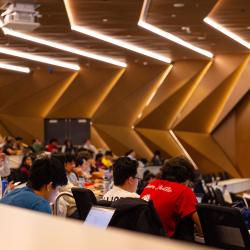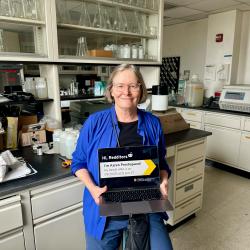Atmospheric Science Background Gives Alum a Leg Up in Finance World
Graham Haederle (B.S. ’23, atmospheric and oceanic science; B.S. ’23, finance) helps companies play a part in climate change solutions.
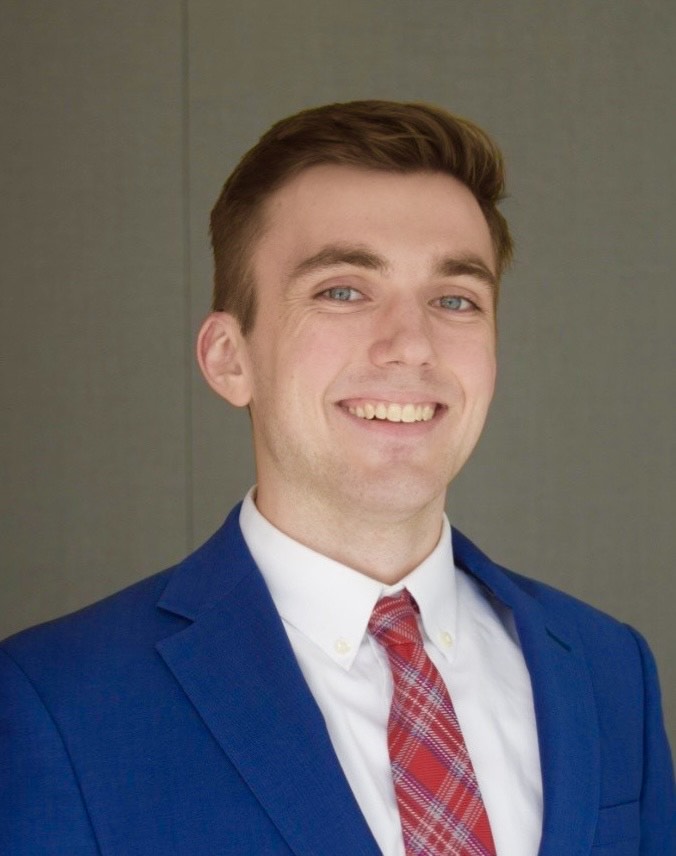
As Earth continues to experience record-breaking temperatures, rising sea levels and increasingly severe storms, businesses will need to adapt. Around the world, companies are weighing the financial impacts of climate change and investing in infrastructure to help offset those effects.
For corporations wanting to implement clean energy and reduce carbon dioxide emissions, Graham Haederle (B.S. ’23, atmospheric and oceanic science; B.S. ’23, finance) is there to help. As an investment banking analyst who covers power and utility companies, Haederle leverages both of his degrees to advise businesses on power assets they are considering constructing, purchasing or selling.
Thinking about climate change through a business lens is nothing new for Haederle. As an undergraduate student, he and his teammate, Alex Friedman (B.S. ’23, atmospheric and oceanic science), won UMD’s inaugural climate finance competition for their project that assessed the financial impacts of flooding on businesses located on the Chesapeake Bay.
“We evaluated several scenarios of future flooding to see how revenues and costs would change,” Haederle said. “In my current role, my team and I provide advice on how our clients can finance power assets, and the impacts of climate change are key considerations in our recommendations. My experience during the climate finance competition gave me the skills to perform well in this role while also being able to understand and communicate with both operators and investors.”
Haederle works at Scotiabank, a Canadian bank, and credits his experiences at Maryland—including the climate finance competition—for leading him down the path to a career in climate finance.
‘A different direction’
UMD’s annual climate finance competition was founded by Atmospheric and Oceanic Science (AOSC) Adjunct Professor Robert Brammer (M.A. ’70, Ph.D. ’72, mathematics) and is jointly sponsored by AOSC in the College of Computer, Mathematical, and Natural Sciences and the Finance Department in the Robert H. Smith School of Business.
Teams must have at least one finance major and one AOSC major to participate, and they’re tasked with exploring a climate-related issue of their choice. This year’s contestants will present their projects on May 2, 2024, at an AOSC student research symposium.
AOSC Associate Professor Timothy Canty said the competition gives students real-world lessons in climate finance, which is becoming increasingly useful in the job market.
“The private sector is focusing a lot of resources on understanding the risks associated with a changing climate, which means there's a growing need for scientists who can effectively communicate across fields,” said Canty, who helps organize the competition. “This competition is so important because it gives students experience and training they won't get in their regular classes and exposes them to tremendous job opportunities outside of the traditional scientific research track.”
When Haederle saw an advertisement for the inaugural climate finance competition in 2020, he thought it sounded like an interesting way to expand his business acumen.
“I really enjoyed studying finance, but I wanted to take it in a different direction than a typical career in banking or consulting,” Haederle said. “When the climate finance competition was announced, I contacted a friend who was an AOSC major and the two of us registered.”
Haederle and Friedman researched how flooding would impact a company’s profits and valuation over 10 years. They explored the science of flooding to learn how it would affect businesses on the Chesapeake Bay and crunched numbers to determine the best way for businesses to financially prepare.
“We took a hypothetical seafood restaurant that would exist on the Bay and ran different case scenarios to see if it would be more expensive for a company to buy flood protection insurance and invest in flood infrastructure now or later,” Haederle said. “We found that when you’re dealing with climate change, it costs you more down the line than if you were to take preemptive measures now.”
Haederle enjoyed the experience so much that he ultimately declared a second degree in AOSC to better understand climate science. During his senior year, he worked with Brammer on wind turbine research and also attended an American Meteorological Society conference that helped set the stage for his future.
“At the conference, I met people working at utility companies who forecast weather to protect utility infrastructure, and I met people working at investment firms that invest in climate resiliency,” he said. “That is when I started to realize that there was another career path available in climate aside from research and academia. I started to visualize how I could combine my finance and AOSC background.”
‘The next dot-com era’
Shortly after graduating, Haederle received an offer to work at Scotiabank, where he primarily advises power and utility companies on how to finance low-carbon power assets and raise capital.
Haederle said it’s uncommon for people in his field to have a scientific degree, but his AOSC background has been an asset. Some of the companies he works with are investing in “clean tech”—everything from electric vehicle batteries to carbon capture systems—and it helps to understand how these emerging technologies can help solve problems caused by climate change.
“I find it rewarding to have both a background in finance and atmospheric science since I can appreciate how these technologies work,” he said. “And in my long-term career, that’s going to be extremely helpful since people in finance value those with a scientific background who have conducted research in these fields."
Haederle said the companies he works with are increasingly interested in lowering their carbon footprint and have an important part to play in fighting climate change.
“I find that a lot of people in my field want to develop power generation that’s sustainable and alleviates the effects of climate change,” he said. “What’s great about this industry is that you need a wide variety of roles—including scientists, engineers, policy experts and financiers—to eliminate CO2 emissions while maintaining a dependable electricity grid.”
Haederle is happy to have found a line of work that feels gratifying and combines his two interests in atmospheric science and business. For those who want to pursue a career in climate outside of research and academia, Haederle recommended looking into climate finance.
“I would tell students that if they want to enter a rewarding, impactful industry, climate finance is the next dot-com era,” he said. “There’s a massive hiring demand for people who understand how to price the impacts of climate change. In the intersection of finance and climate risk, not only are you doing a lot of good for our planet, but there’s also a large financial opportunity to be found.”



